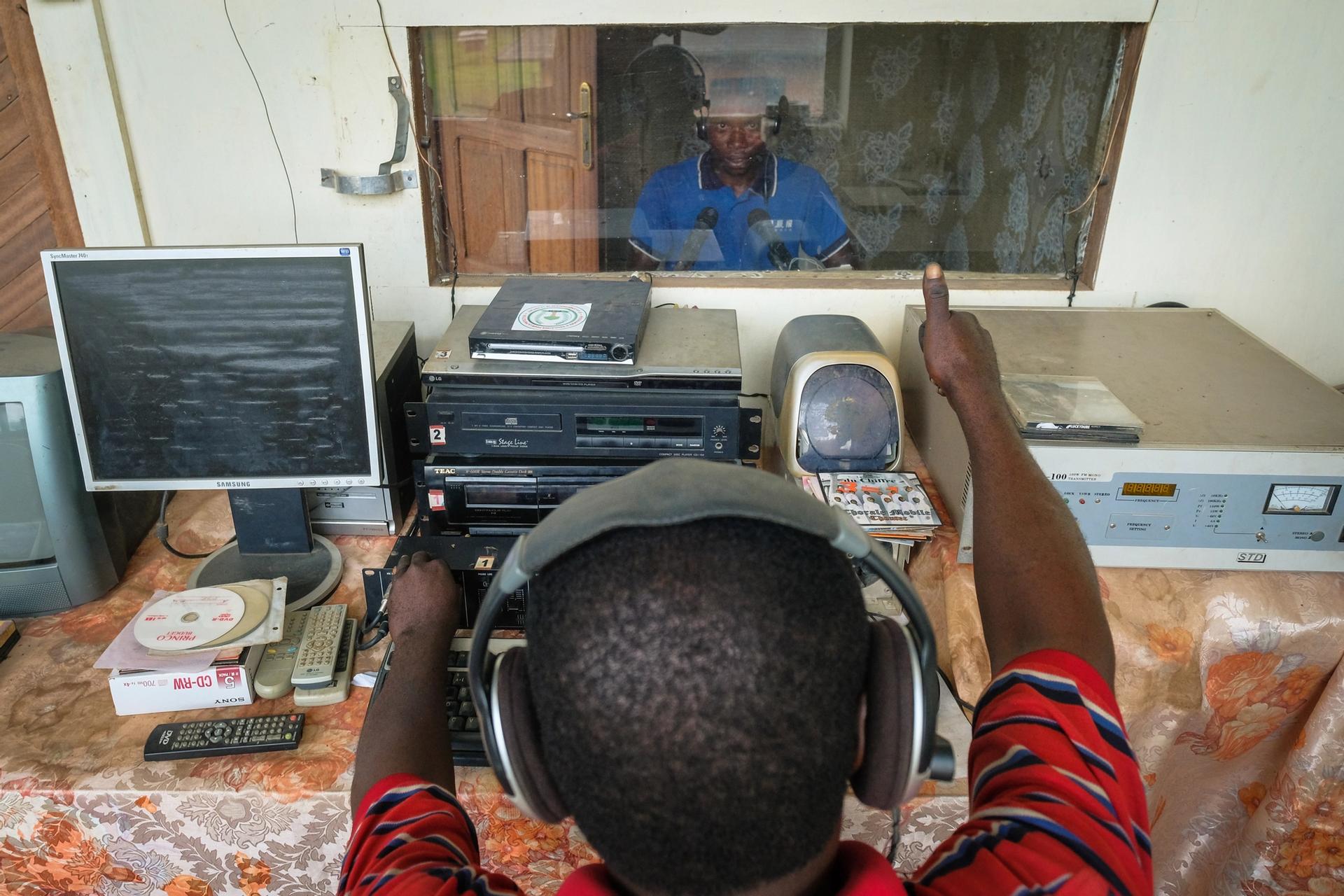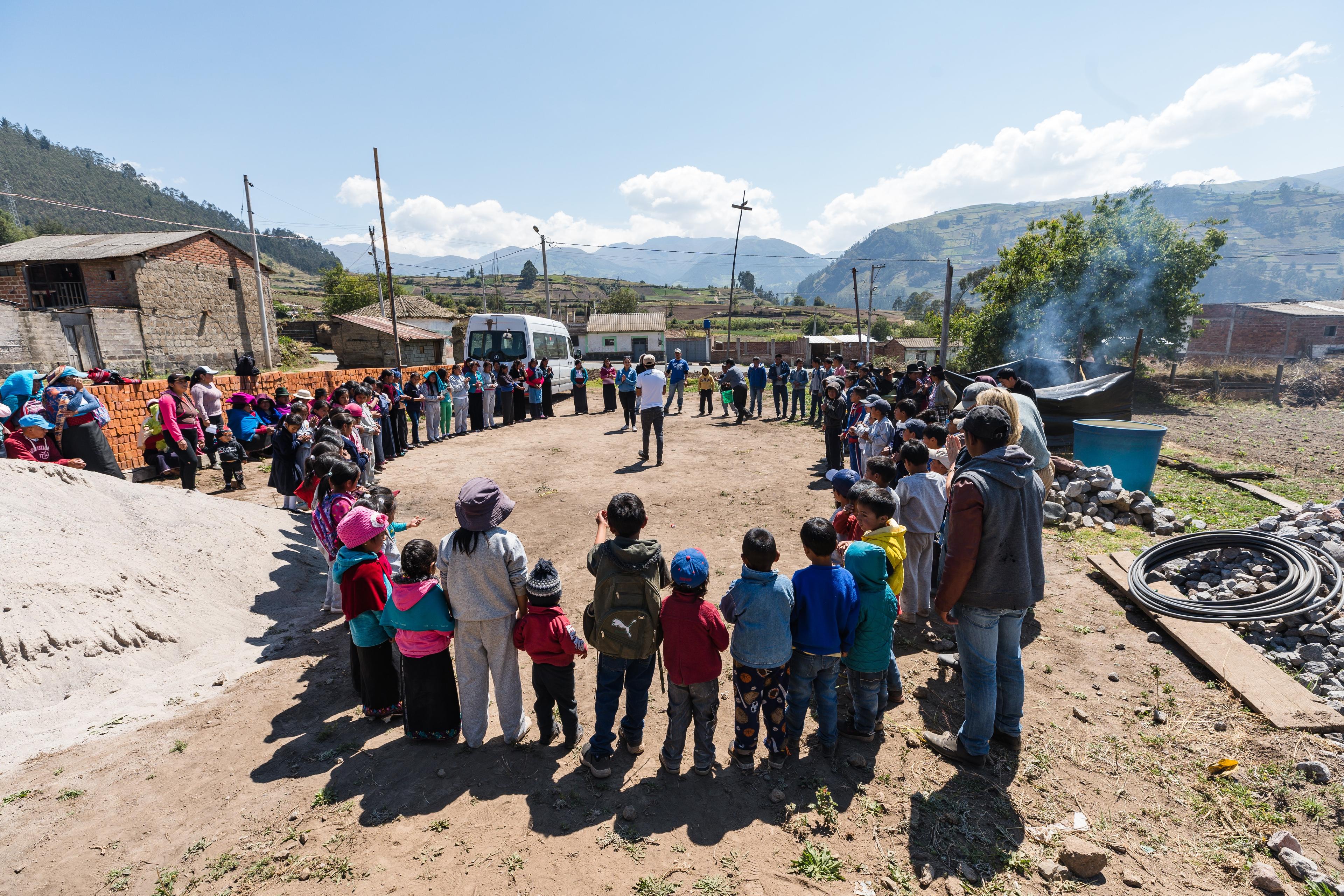Blog
Community mobilisation: a strategy to rebuild trust and promote vaccine uptake in sub-Saharan Africa

This is part two of a two-part series, The links between vaccine hesitancy, mistrust, and corruption. Read part one on Vaccine hesitancy, institutional mistrust and corruption in sub-Saharan Africa: everything is connected.
In our previous blog, we saw that a legacy of corruption is one of the factors fuelling institutional mistrust and vaccine hesitancy in sub-Saharan Africa. The dwindling confidence in Covid-19 vaccines is reduced even further by the constant news of corruption and abuse in the pandemic response. Long-term solutions are necessary but ‘quick-fixes’ are urgently needed as well, to reverse this downward trend. Community strategies offer development actors a proven short-term approach for building trust in contexts where the government is perceived as corrupt, and people are increasingly hesitant to be vaccinated.
Community communication promotes trust and dispels misinformation
Many African nations have decades of community experience in dealing with infectious diseases; they also have the solutions to deal with the coronavirus pandemic.
Uganda’s response, for example, has leveraged – and with donor support, adapted – existing health infrastructure and community knowledge. It appears, so far, to be a success. However, keeping the momentum going relies on trust being sustained, and displays of vaccine hesitancy from the Ugandan president have the potential to undermine everything that has been achieved.
The flood of misinformation and conspiracy theories is largely to blame for the growing concerns around vaccines and other Covid-19 measures, and it does not help public confidence when public officials appear to endorse those concerns. Since fake news travels faster than true stories, jumping from one medium to the next, governments and development actors need to act fast and coordinate communication strategies that consider the whole of society.
Messages, channels and messengers for official health advice
The constant flood of information influences citizens’ perception and trust in their governments. A resolution was passed at the World Health Assembly in response to the Covid-19 pandemic, mandating WHO member states to “Provide the population with reliable and comprehensive information on Covid-19 and the measures taken by authorities in response to the pandemic…”.
The resolution shows an awareness that efforts are needed to combat the growing infodemic. However, putting the resolution into practice can be challenging, particularly in countries where the government is perceived as corrupt, ill-intentioned and self-serving. Even if experts are used to provide reliable information, doing so through government channels might undermine their message. Instead, non-state actors can use non-governmental channels, such as community radio stations, to counter misinformation, build trust and dispel vaccine fears.
One example comes from rural Bangladesh, where a Covid-19 vaccination campaign has been broadcast on community radio to raise awareness and build demand. The show centres around the government’s Covid-19 vaccine rollout and the lived experiences of the local community in the vaccination process. With the support of multiple actors, the show has been a success in addressing the communities’ concerns and increasing vaccine confidence and uptake.
When multiple actors come together to raise the voice of the community, misperceptions and misinformation can be curbed, and public trust can be sustained.
Mobilising community influencers and ‘gossipers’ improves vaccine uptake
Community mobilisation: a strategy to rebuild trust and promote vaccine uptake in sub-Saharan Africa
In our previous blog, we saw that a legacy of corruption is one of the factors fuelling institutional mistrust and vaccine hesitancy in sub-Saharan Africa. The dwindling confidence in Covid-19 vaccines is reduced even further by the constant news of corruption and abuse in the pandemic response. Long-term solutions are necessary but ‘quick-fixes’ are urgently needed as well, to reverse this downward trend. Community strategies offer development actors a proven short-term approach for building trust in contexts where the government is perceived as corrupt, and people are increasingly hesitant to be vaccinated.
Community radio can be an effective way to counter misinformation, build trust and dispel vaccine fears. Kulokoko radio station in Yangambi, Democratic Republic of the Congo. Photo: Flickr/Axel Fassio/CIFOR, Creative Commons.
This is part two of a two-part series, The links between vaccine hesitancy, mistrust, and corruption. Read part one on Vaccine hesitancy, institutional mistrust and corruption in sub-Saharan Africa: everything is connected.
Written by:
Daniel Sejerøe Hausenkamph – Adviser, U4 Anti-Corruption Resource Centre at Chr. Michelsen Institute
Community communication promotes trust and dispels misinformation
Many African nations have decades of community experience in dealing with infectious diseases; they also have the solutions to deal with the coronavirus pandemic.
Uganda’s response, for example, has leveraged – and with donor support, adapted – existing health infrastructure and community knowledge. It appears, so far, to be a success. However, keeping the momentum going relies on trust being sustained, and displays of vaccine hesitancy from the Ugandan president have the potential to undermine everything that has been achieved.
The flood of misinformation and conspiracy theories is largely to blame for the growing concerns around vaccines and other Covid-19 measures, and it does not help public confidence when public officials appear to endorse those concerns. Since fake news travels faster than true stories, jumping from one medium to the next, governments and development actors need to act fast and coordinate communication strategies that consider the whole of society.
Messages, channels and messengers for official health advice
The constant flood of information influences citizens’ perception and trust in their governments. A resolution was passed at the World Health Assembly in response to the Covid-19 pandemic, mandating WHO member states to “Provide the population with reliable and comprehensive information on Covid-19 and the measures taken by authorities in response to the pandemic…”.
The resolution shows an awareness that efforts are needed to combat the growing infodemic. However, putting the resolution into practice can be challenging, particularly in countries where the government is perceived as corrupt, ill-intentioned and self-serving. Even if experts are used to provide reliable information, doing so through government channels might undermine their message. Instead, non-state actors can use non-governmental channels, such as community radio stations, to counter misinformation, build trust and dispel vaccine fears.
When multiple actors come together to raise the voice of the community, misperceptions and misinformation can be curbed, and public trust can be sustained.
One example comes from rural Bangladesh, where a Covid-19 vaccination campaign has been broadcast on community radio to raise awareness and build demand. The show centres around the government’s Covid-19 vaccine rollout and the lived experiences of the local community in the vaccination process. With the support of multiple actors, the show has been a success in addressing the communities’ concerns and increasing vaccine confidence and uptake.
When multiple actors come together to raise the voice of the community, misperceptions and misinformation can be curbed, and public trust can be sustained.
Mobilising community influencers and ‘gossipers’ improves vaccine uptake
Community mobilisation is a novel entry point for development actors to build integrity in the health sector and promote vaccine uptake. The strategy centres around collective action to increase participation, awareness and vaccine uptake. This approach employs community influencers, such as informal leaders and even ordinary people, to promote trust and confidence where the government cannot.
The power of community mobilisation to increase trust in service delivery has proved successful in tackling vaccine-preventable diseases. Sierra Leone, for example, went from having 6% of children vaccinated in 1986 to 75% 1990. The success was in part due to the identification of religious leaders as important community influencers, with pastors and imams using relevant verses from the Bible and Qur’an to promote vaccination during their sermons. This platform for community mobilisation was adapted and used again in Sierra Leone’s response to the coronavirus pandemic. The adapted effort mobilised village elders, chiefs and key female leaders to spread Covid-19 information in their community networks. This was an important step to ensure that valid information reached rural communities in a way that promoted trust and vaccine confidence.
The provision of valid information in a timely manner can mean the difference between life and death in emergency situations. Combating misinformation, therefore, requires not only trust but also speed. A novel way to support community influencers in spreading valid information quickly is through community ‘gossipers’. These nominated ‘gossipers’ have shown to be remarkably effective in disseminating information both fast and wide. In the Indian district of Haryana, for example, community gossipers increased vaccine uptake in children by 27% in comparison to a random control group.
If people mistrust the government, then other means of community mobilisation, such as gossipers, can help convince those who are the most mistrusting and hesitant to get vaccinated. While informal leaders are still credible and trusted messengers in many communities, additional communication strategies like this can complement their influence to make sure no one is left behind.
The Covid-19 pandemic is a window of opportunity for donors to promote public trust in the health sector and emergency responses. Trust and citizen engagement are built when we place community mobilisation and communication strategies at the centre of those responses. While these strategies do not address the cause of the vaccine hesitancy problem – mistrust in the government – they can help disrupt its effect in the short term.
Disclaimer
All views in this text are the author(s)’, and may differ from the U4 partner agencies’ policies.
This work is licenced under a Creative Commons Attribution-NonCommercial-NoDerivatives 4.0 International licence (CC BY-NC-ND 4.0)
